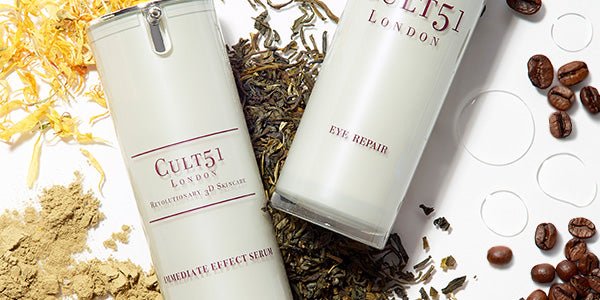How true are these well-known beauty 'facts'?
It isn’t always easy to distinguish fact from fiction when it comes to beauty beliefs. Many of these so-called ‘facts’ have been passed down from generation to generation, and even the ones that have been disproven are still being retold! That’s why we’ve decided to investigate a few of the most popular misconceptions and prove them wrong.
Wearing suncream makes us deficient in Vitamin D
Researchers in the past have suggested that suncream may be a factor in the lack of Vitamin D production and that people, therefore, shouldn’t wear it every day. However, this myth has since then been disproven. In fact, recent studies show that using suncream daily may maintain Vitamin D levels in most people. The body naturally produces Vitamin D within a few minutes of sun exposure. However, too much sun exposure will lead to skin damage rather than giving your skin the goodness from the sun that it needs. It's crucial to remember that unprotected sun exposure for even just 10 minutes is more than enough to damage your DNA, which can result in genetic mutations and increase your chances of developing skin cancer.
So, please continue to wear sunscreen every day not only to prevent premature ageing but also to stay protected.

You can’t use active skincare ingredients when you’re pregnant.
It might be advised to avoid Vitamin C, Bs, and Niacinamide (found in meat, poultry, fish, nuts, and vegetables) during pregnancy, but research has shown that these active ingredients are perfectly safe for your baby’s development.
In fact, most active ingredients are safe to use during pregnancy. However, there are some exceptions, and stronger actives, such as retinol and salicylic acid, that may put your baby at risk. Having adequate Vitamin A is important for your baby’s development, but it is best to avoid Vitamin A derivatives - such as Retinol, Retin-A and Retinyl Palmitate - during pregnancy as they may have an adverse negative effect on your baby’s growth. Generally, it is best to consult your doctor if you’re unsure on what you can and can’t use, but as a rule, weaker actives tend to be safe and stronger ones may come with risks.
Your skin gets used to skincare and it stops working.
This is a complete myth. Your skin does not become immune to skincare products. In fact, the skin takes time to adapt to changes, so if you regularly change up your skincare, you’ll be more likely to experience flare-ups and irritation.
We boast over the cumulative effects our products deliver, which means the more you use them the greater the result. So, keeping to a skincare routine that works for you is the best way to maintain your skin’s health and reap the long-term benefits.

Washing your hair too often is bad for you.
There is a misconception that frequent hair-washing strips your hair and leads to the overproduction of oil and that you should therefore train your hair to last longer between washes. However, this isn’t the case at all. Depending on your hair type, you will require a different hair care routine. Straight and fine hair needs to be washed more frequently, as the natural hair oils travel down the shaft more easily. Whereas thicker, curlier hair shouldn’t be washed too regularly else you risk the ends drying out. So long as you use gentle products, you can wash your hair as much as you like. In fact, there have been clinical studies that have shown that frequent hair-washing may actually be beneficial to your hair and scalp.
Parabens are dangerous.
According to cosmetic scientist Sam Farmer, “Parabens are ingested by most people every day in fruit and vegetables. They are safe, found in nature, skin-friendly and a fantastic preservative. Saying all parabens are bad is a bit like saying all mushrooms are bad.” Safety panels across the globe have stated that parabens, as currently used in their cosmetic application, are safe. In fact, they’re among the least-sensitising preservatives available, even more so than several preservatives used in “paraben-free” products. If you choose to use products that don't contain parabens, that's your personal decision - but please remember that parabens are among the most researched and safest ingredients to use when it comes to effectively preserving the make-up and skincare products we love.
Shaving your legs causes the hair to grow back thicker and darker.
Shaving hair does not change its thickness, colour or rate of growth. Clinical studies proved this misconception to be untrue in 1928, but for some reason, this myth persists. This might be because regrowth after shaving often looks different. New hair may look darker and thicker, but this is partly due to how the hair is cut off and only tapers as it grows out. New hair may also appear different because it hasn’t yet been exposed to elements such as sun exposure, soaps and other chemicals, which can all lighten your hair. So, unfortunately, shaving hair has no effect on how it grows back. Otherwise, we’d all be shaving our heads to get thick, luscious locks.

Coconut oil will help you with everything.
Coconut oil is sadly not a solution to everything. It does a great job moisturising your body and hair, but it can have undesirable effects if used on your face. Coconut oil has a high capric acid content that will clog your pores, leading to breakouts and a dull complexion. It is believed that coconut oil might restore moisture on porous and damaged bleached hair. Although coconut oil doesn’t repair the damage, it may significantly improve its condition. Just, make sure to use coconut oil sparingly and to wash it out properly, otherwise, it will leave your hair feeling greasy and flat.
Eating chocolate and junk food gives you breakouts.
You’ll be pleased to hear that this isn’t necessarily true. Studies have shown that including a clean diet as part of an overall healthy lifestyle does have a positive impact on your skin, however, there is no evidence to suggest that indulging in the occasional treat will result in a breakout or eating clean will guarantee clear skin. Generally, so long as you are for the most part healthy, having a few guilty pleasures throughout the day won’t cause you to breakout. The only foods that may link to bad skin are dairy products and alcohol, however, only when consumed in excess. And fun fact, dark chocolate is actually proven to have many health benefits, including for your skin!
Cucumber Reduces Eye Puffiness.
The cucumber itself does not reduce puffiness. It’s really the coldness and chillness that acts as a vasoconstrictor, constricting the blood vessels and draining excess fluid out of the tissues to reduce puffiness.

So, I suppose we can say that we have all been misled by some of these myths throughout our lives.



